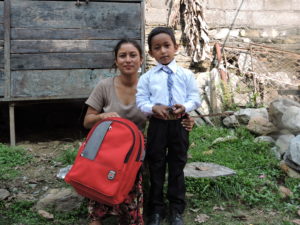 When Shenpen Tibet Aid just started up the new school project in Nepal, getting school things to children from the poorest families, we didn’t realize that most of the mothers of the 23 children who got help to start another year at school, were single caretakers. The women had married early, some as early as 14, and dropped out of school to serve the home. When the husband left, started drinking, or perhaps got sick or died, they found themselves in difficulties. Without any education they face a life of financial hardship caring for their children alone. Single or abandoned women have few rights in Nepal, and there is no social security system they can turn to.
When Shenpen Tibet Aid just started up the new school project in Nepal, getting school things to children from the poorest families, we didn’t realize that most of the mothers of the 23 children who got help to start another year at school, were single caretakers. The women had married early, some as early as 14, and dropped out of school to serve the home. When the husband left, started drinking, or perhaps got sick or died, they found themselves in difficulties. Without any education they face a life of financial hardship caring for their children alone. Single or abandoned women have few rights in Nepal, and there is no social security system they can turn to.

I was lead to the families by women from Mother Groups in Pokhara, specially Sabitra, a goodhearted brahmin woman who puts lots of energy into helping the poor, often the lower casts. In between the good guest houses and shops in Pokhara people live in slum like houses. We met mothers who worked 3 cleaning jobs a day, but after paying the rent hardly had rice in the house and nothing to pay the school things with. Pabitra, a mother of two, had lost everything in the earthquake, both her parents and her house. Her husband left her when she was having her second baby. Now she is desperately trying to get a job in Pokhara. But who will give her a job when she has a 4 year old and a baby in her arms? Her little daughter got admitted in the nursery, full school uniform, bag and all, as is normal in Nepal.
The women were extremely relieved when we got their children school bag, uniform and shoes, school books and stationary for a year. It took a lot of walking and taking buses and a couple of taxis to get it done. And a lot of waiting for tailors to get the school uniforms finished. Delay is the name of the game working in India and Nepal. One of the hardships of the job…

Two of the children were living with their drunk grandparents. Amrit, a 12 year old boy, looked hard. No wonder, I thought, when I saw the house. A terrible room where both the grandparents lay on the bed, drunk and collapsed at lunch time. Amrit lives there with his sister Amrita who is 8. They both missed last year of school, and were extremely happy to be able to go to school again. We also bought some food for their house.

Another partner in this project was Kopila Nepal, an organization who works for children and women’s rights. They started out helping children, but soon realized that to help the children they needed to help the mothers, who have very few legal rights in Nepal. Among many activities they run a Safe Home in Pokhara where abused and traumatized women can get shelter, protection and treatment, and work in the villages to provide psychosocial counselling and informing about children and women’s rights. Women who get abused or abandoned by their husbands and families have a big problem as the social stigma is great.
One Sunday we accompanied 8 children of poor women who have been to the Safe Home earlier, and now have returned to their families and villages, to buy all the school things. All together 14 people in the bus and into the huzzle and buzzle of Pokhara’s shops and markets. Hot. Cloth shops, book shops, shoe shops, school bags for everyone. Some children came many hours on the bus to get the school things.

Right when school started, I was led to an 11 year old boy, Susan, who lives alone with his sister and brother, 16 and 17 years old. Both their parents died, and they only have a cow and a small piece of land where they grow vegetables. Susan didn’t have any school things. His sister was just about to take her final exam, but had to work to get food. Fortunately I had a cash donation to spend for poor people, so we went to the shop to get the children 25 kg rice and lots of other dry food. They also got a much needed gas container, since they only cooked by firewood and had to go searching for wood every day. The sister was greatly relieved. With food in the house, she could concentrate on studying for her final exam. I am amazed at these determined children, studying so hard without parents to pressure them. I guess they have no other choice than to succeed.
Manisha was the last to join the project. Sabitra from the Mother Group and I had actually been looking for her, since we knew her from before. A young 20 year old mother walking around with her baby wrapped in a shawl in front, her big basket of beans strapped around her forehead and her 5 year old boy in the hand. She came to Pokhara to find work after her husband left her for another woman. When we met her she was selling beans that she had borrowed from a kind merchant in a shop, trying to support her children with that. When the bean season finished and her work went down, she started carrying rocks in building sites.

Now she just came back from a visit to the parents of the father of the children who live in the mountains. She tried to get some help when her children got sick. The grandparents didn’t want to talk to her, much less help the children, since their son now has another wife. She returned to Pokhara looking sad and pale, with no food in her tiny room. Her little son got all he needs to start school. And she got food for the house, and a little hope in a bleak situation.
A dream arises in my mind. What is obvious here is that these women become financially stronger. Of course, in the long term one has to work to prevent girls from marrying too young and drop out of school. One needs a social revolution…. But the young women and mothers who are already in that situation need income from something less hard than carrying rocks, which pays extremely low. One day walking along the lake with a few of the mothers, I asked them what they would dream to do. They dreamed up tailoring, hairdressing, making dolls. One sweety dreamed of acting in films in Bollywood. Well, the last we cannot do much about, but perhaps tailoring? Everything in life starts with dreaming about it. Empowering women through giving them skills that can earn a living. We’ve done it before.
As I know my Shenpen colleagues and friends, they like that kind of dreams too. And then we will see how it could develop. Slowly, from the ground up. Like planting a fruit tree.
Many, many thanks to kind sponsors in Norway who helped us with school uniforms and school things!

